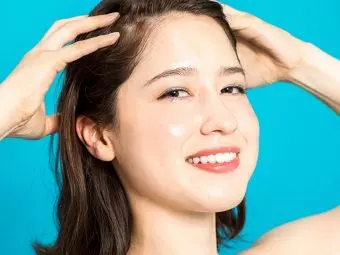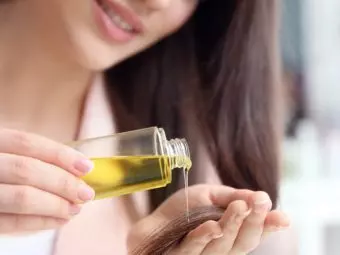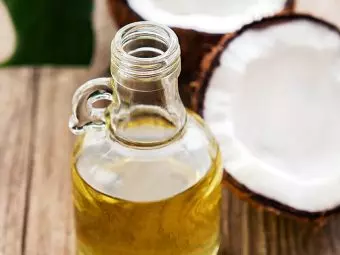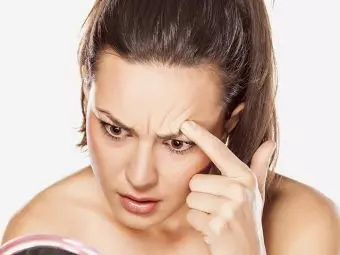If you pay attention to labels on products, you may have come across mineral oil for hair. But with a war raging against skin and hair care products that contain petrochemicals, mineral hair oil has stirred up fear and confusion in buyers.
To clear your doubts, you must approach the issue the right way. Knowing why mineral oil for hair is touted as harmful is the first step. That will determine if you should steer clear of products containing mineral oil. Read on to learn the truth about mineral oil for hair before you jump to conclusions. Here’s everything you need to learn about mineral hair oils. Scroll down!
In This Article
What Is Mineral Oil?
Mineral oil is a transparent, odorless oil obtained through fractional distillation of crude oil. It also goes by the name of ‘liquid petroleum’ or ‘paraffin oil’ and belongs to a class of chemicals called hydrocarbons. The oil is used in many cosmetic and personal care products, including foundations, lipstick, sunscreens, and hair products.
The rising popularity of mineral oil as a cosmetic ingredient can be attributed to its lubricating properties. It creates a barrier on the skin and hair to lock in moisture. This way, the oil gives a luminous glow and smooth, luxurious feel to the hair and skin. What’s more, mineral oil is inexpensive, non-allergenic, and less susceptible to oxidation and getting spoiled.
Why does mineral oil get so much flak? And if it is so bad, why is it still used in so many hair care products, such as shampoos, conditioners, and cleansers? Let us find out.
Is Mineral Oil Really Bad For You?
The biggest concern with mineral oil is that it is a cheap by-product extracted from petroleum and other petroleum-based products. This is the stuff you commonly use to lubricate your car engine or other machinery. Hence, a lot of people are understandably concerned that it is laced with high concentrations of hazardous pollutants.
There is a longstanding notion that mineral oil also has potential cancer-causing properties. However, you can put all these doubts to rest!
The mineral oil used in beauty and personal care products undergoes rigorous purification, and you can be assured that it is safe and non-toxic. Don’t believe us? ChemicalSafetyFacts.org, a website developed and maintained by the American Chemistry Council, supports our claim (1).
According to the website, the FDA and international regulatory agencies like the Cosmetics Directive of the European Union permit the use of mineral oil in personal care products and cosmetics with no listed restrictions.
As for claims that mineral oil in cosmetics can potentially cause cancer, there is no conclusive evidence yet. Of course, when mineral oil is untreated or mildly treated, it can contain cancer-causing materials. But cosmetic-grade mineral oil needs to comply with high quality and safety standards and is, therefore, not considered toxic.
Moreover, mineral oil does not penetrate human skin or affect internal organ systems (2). But the question remains: is mineral oil good for your hair?
Can Mineral Oil Be Used On Hair?
The opinions on whether or not mineral oil is bad for hair are conflicting. It is an excellent lubricant and detangler for thick curly hair. Hence, if the oil works for you, why not?
Health hazards from using mineral oil on hair are also rare, so you have no cause for concern. Some people, however, worry that it can cause greasy buildup on the scalp. If that bothers you, try to use it sparingly and only if or when you need it.
In short, the choice comes down to your subjective experience – if you have thin hair and the residue from mineral oil is turning out to be an absolute nightmare, you should avoid it. But if you grew up using mineral oil to tame your tresses or your favorite hair product happens to contain mineral oil, there is no reason to stop using it.
As a commonly used oil in hair grooming, mineral oil has quite a few benefits. Let us look at some of the benefits of mineral oil for hair in the following section.
Advantages Of Using Mineral Oil For Your Hair
- Traps Moisture
If you have dry, frizzy hair, mineral oil is one of your best bets to lock in hydration. Mineral oil forms a barrier over hair cuticles to trap moisture and protect the hair from environmental aggressors.
- Non-Greasy
Mineral oil is non-greasy, which is one reason it is extensively used in hair oil formulations (3). When used in small amounts, mineral oil can give your hair a smooth, glossy glow without leaving a slick coating or weighing your hair down. It is also a natural potion for healthy, defined curls.
- Shields The Hair From Water Damage
Water penetrates the hair shafts and causes swelling, making your locks vulnerable to damage. Mineral oil naturally repels water, thereby protecting your hair from damage due to repeated swelling and drying (4).
- Lightweight And Easily Absorbed
Another reason mineral oil is good for your hair: it is lightweight and fast-absorbing. It will leave your hair feeling less weighed down than heavy oils like coconut, castor, and olive oils.
If you have low-porosity hair, using a lightweight oil like mineral oil allows for easy moisture absorption. On the other hand, heavy oils tend to sit on the hair surface, preventing moisture absorption.
- Combats Frizzy Hair
Dry hair and stubborn knots are something we all frequently struggle with. Well, mineral oil can be the answer to your detangling woes! Mineral oil creates slip, making it easy to comb out tangles without damaging hair. It can also minimize frizz by acting as a barrier to moisture.
As we pointed out earlier, frizziness occurs when too much moisture penetrates the hair strand, causing it to swell. Mineral oil can stave off moisture by creating a protective barrier around the hair.
- May Help Treat Dandruff
Mineral oil may help relieve dandruff. It moisturizes and softens the dry and flaky scalp, providing relief from the itchiness and discomfort. Apply mineral oil to the scalp and leave it on for at least an hour for best results.
Subscribe
- Remedy For Head Lice
Recent scientific research indicates that mineral oil can also serve as a potential cure for lice. A study demonstrates that mineral oil disrupts the normal water and gas exchange of adult lice and their eggs, thereby eliminating them (5). Hence, if you need a cheap, safe, and non-toxic treatment for head lice, mineral oil can be your best bet.
We have highlighted all the benefits of mineral oil, but it is equally important to understand the side effects of mineral oil on your hair and scalp.
Side Effects Of Mineral Oil To Keep An Eye Out For
As mineral oil is a chemically stable, inert ingredient that does not spoil easily, it rarely causes any severe allergic reactions. Nevertheless, some people may experience the following physical side effects:
- Allergic Reactions
Although rare, mineral oil can sometimes irritate the skin and induce allergic reactions, such as red spots, itching, swelling, or rashes.
- Risk Of Scalp Irritation
Scalp irritation is another possible side effect of mineral oil. Long-term use of mineral oil can be bad for your hair as it can lead to scalp buildup and cause itching or eczema flares. Scalp buildup can also clog pores and is linked to rapid hair loss.
- Redness Or Eye Irritation
Mineral oil may cause temporary irritation and redness if it comes in contact with your eyes. If eye irritation occurs, try splashing your eyes with cold water to soothe the irritation.
- Risk Of Toxicity
If mineral oil is accidentally swallowed or ingested, it may accumulate in human organs. In fact, mineral oil hydrocarbons are among the greatest contaminants of the human body, amounting to nearly 1 gram per person. Moreover, cosmetics are found to be a relevant source of this contamination (6).
- Acne
Mineral oil is not commonly cited as an acne-causing ingredient. However, sometimes when you rinse your hair, the oil can run down your face, back, or chest. This way, mineral oil may leave a residue behind that can irritate the skin and cause breakouts.
Key Takeaways
- Mineral oils can protect you from hair damage, keep your hair moisturized, and fight frizz.
- They can cause scalp irritation, allergic reactions, eye irritation, and acne.
- Try using mineral oil sparingly on the hair to prevent greasy buildup on the scalp.
To recap, mineral oil is increasing in popularity as a cosmetic ingredient because it locks in moisture and lubricates the skin. Mineral oil is non-allergenic, less susceptible to spoilage and oxidation, and inexpensive.
You can use mineral oil for hair care, especially if you have curly hair. It helps detangle and lubricate thick, curly hair. It traps moisture in the hair strands, has a non-greasy texture, protects the hair from water damage, and curbs frizz. However, it can be unsuitable for thin hair as it leads to build-up. It is recommended to use mineral oil in moderation and with some caution.
Frequently Asked Questions
Mineral oil vs. coconut oil – which is better?
Coconut oil is a better alternative to mineral oil. Mineral oil is a safe oil. However, unlike coconut oil, it does not nourish the hair. Coconut oil can prevent protein loss in both damaged and undamaged hair (3). Mineral oil, on the other hand, has no favorable impact on protein loss (3).
How can mineral oil be removed from hair?
Shampoo can help dissolve mineral oil in hair and prevent its buildup on the scalp. Wash your mane with a gentle shampoo and conditioner to effectively remove mineral oil.
Is mineral oil safe for baby hair?
The words mineral oil and baby oil are sometimes used synonymously, indicating that it may be safe for baby hair. A baby’s hair is, however, fine and fragile. Since there is no concrete evidence regarding the safety of using mineral oil for baby hair, it is better to be cautious of potential allergic reactions.
Sources
Articles on StyleCraze are backed by verified information from peer-reviewed and academic research papers, reputed organizations, research institutions, and medical associations to ensure accuracy and relevance. Check out our editorial policy for further details.
- Mineral Oil.
www.chemicalsafetyfacts.org/mineral-oil/#answering-questions - Mineral oils and waxes in cosmetics: an overview mainly based on the current European regulations and the safety profile of these compounds.
pubmed.ncbi.nlm.nih.gov/31588613/ - Effect of mineral oil, sunflower oil, and coconut oil on prevention of hair damage.
pubmed.ncbi.nlm.nih.gov/12715094/ - Hair Cosmetics: An Overview.
www.ncbi.nlm.nih.gov/pmc/articles/PMC4387693/ - Efficacy and safety of a mineral oil-based head lice shampoo: a randomized, controlled, investigator-blinded, comparative study.
pubmed.ncbi.nlm.nih.gov/27286033/ - Evidence for cosmetics as a source of mineral oil contamination in women.
pubmed.ncbi.nlm.nih.gov/21970597/
Related
The following two tabs change content below.
- Author
- Reviewer
Ramona Sinha
Ramona is an editor at StyleCraze. Prior to that, she authored over 200 articles on skin and hair care. She… more
Dr. Shruti Chavan
(MBBS)Dr. Shruti Chavan is a consulting dermatologist at Dr.Sheth’s Skin and Hair Clinic since 6 years. She is a co-committee… more



 How To Use Jamaican Black Castor Oil For Hair Growth
How To Use Jamaican Black Castor Oil For Hair Growth How To Exfoliate Your Scalp At Home To Clear Excess Oil
How To Exfoliate Your Scalp At Home To Clear Excess Oil How To Apply Oil On Hair: A Step-By-Step Guide
How To Apply Oil On Hair: A Step-By-Step Guide How To Use Coconut Oil For Dry Scalp And Dandruff
How To Use Coconut Oil For Dry Scalp And Dandruff Easy Way To Get The Perfect Twist Out On 4C Natural Hair
Easy Way To Get The Perfect Twist Out On 4C Natural Hair Eyebrow Hair Loss: Causes, Prevention Tips, & DIY Methods
Eyebrow Hair Loss: Causes, Prevention Tips, & DIY Methods Types Of Hair Loss, Causes, Treatments, & Prevention Options
Types Of Hair Loss, Causes, Treatments, & Prevention Options Itchy Scalp And Hair Loss: How To Treat And How To Prevent It
Itchy Scalp And Hair Loss: How To Treat And How To Prevent It What Is Hair Texturizing? How To Take Care Of Texturized Hair?
What Is Hair Texturizing? How To Take Care Of Texturized Hair?